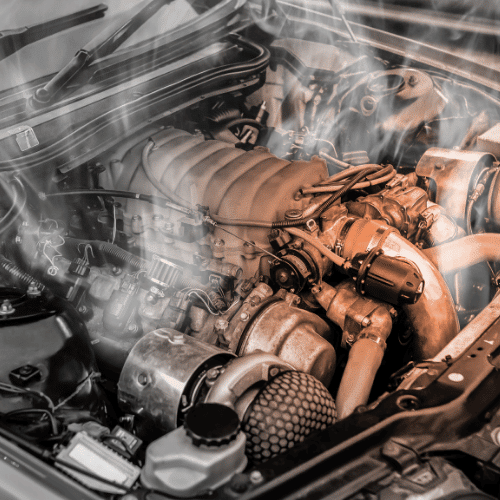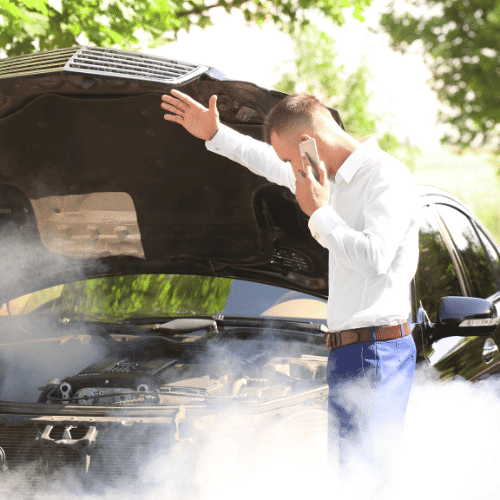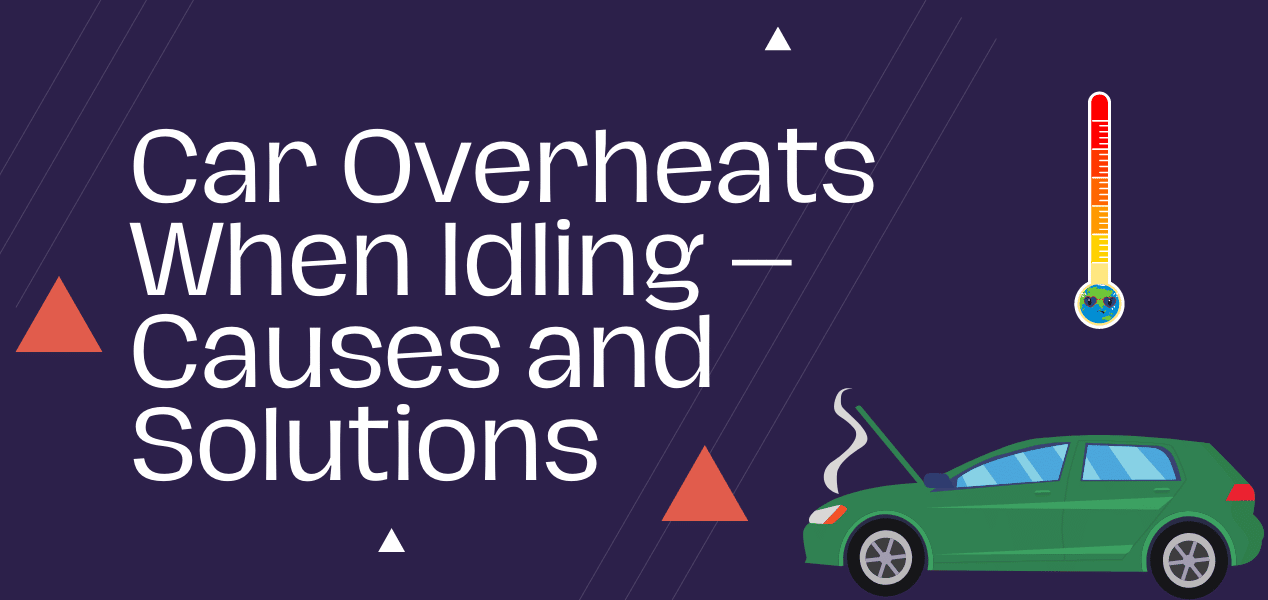When a car starts to overheat while idle, it is a clear sign that there is some sort of problem with the engine’s cooling system. This should be a reason for concern because an overheated engine can cause a lot of permanent trouble to your car.
But before you do anything, let the engine completely cool off. Otherwise, if you touch the engine when it is overheating during idle, you will burn your hand. If this happens while you’re in traffic, then just pull over and call a tow truck.
Here, we will go through all the aspects of why a car overheats when idling, some possible fixes, and tips to avoid this situation in the first place.
Causes Behind Engine Overheating When Idle
Let’s start with the causes behind why a car overheats. There can be multiple reasons behind a car engine overheating. But you can be assured of the fact that it is either connected to the vehicle’s cooling system or a possible engine misfire.

A Problem with the Cooling System
Almost 90 percent of the time, if the engine temperature is up while the car is idle, then it is because of the cooling system. This is because if there isn’t any fault in the cooling system, then the chance of overheating when idle is close to zero.
There are various parts and factors that come into play when we consider how a car’s cooling system works. But generally, the following problems in the cooling system trigger overheating engine issues while staying idle:
Coolant-Related Problem in the System
Coolant flow plays the most important role in a car’s cooling system. And if there is an issue with the coolant, you can be assured that you will face issues with engine overheating.
Low Coolant Level
When the coolant level is low, you need to keep an eye on if your engine starts overheating when idle.
Coolants roam around the entire cooling system, taking the high heat away from the engine, going to the radiator to cool, and continuing the cycle all over again.
But if there isn’t much left in the coolant reservoir, then the engine block overheating is a matter of time. Because while you might be running low on coolant but the car overheating level won’t be low.
What this does is that the coolant can’t keep up with the heat, and as such, the car overheats during idle hours. That’s why it is necessary to keep the coolant level up at any cost
- Faulty Parts
Sometimes it’s not because there isn’t enough coolant, but because it’s a problem in the other parts that don’t let ample amount of coolant come to the engine’s aid. So, you have to check if any part is faulty.
- Environmental Factors
There have been cases where it looks like there is enough coolant in the system, but in truth, there isn’t much. This can be the case if you live in a heated environment.
What happens here is that when extremely heated, the coolant expands, filling more space than it used to. And once the coolant cools down, that space gets empty. And then, the effect is shown through rising engine temperature when the car is idle.
Incompatible Coolant & Leaks
Missing out on quality coolant can also be a reason. Suppose you are witnessing engine overheating when idle after changing your engine coolant recently. In that case, you might have to check the compatibility issue of the new coolant with your car’s engine. However, this happens quite rarely.
Sometimes the reason for a low coolant level is due to coolant leaks. This appears on the path between the radiator and the engine block in most cases. As hot coolant passes through these locations, these parts are much more prone to leaks than the other part where the coolant traverse.
Faulty Thermostat Valve
A thermostat valve is a key to keeping your engine heat in check. An engine overheats when it won’t receive the cooled coolant from the radiator and if the hot coolant doesn’t lose its heat. But what decides when the cold coolant will come, and the heated coolant will go to cool down?
That is the job of the thermostat valves. When an engine overheats and the coolant there reaches a certain level of heat, the coolant temperature gauge sensor triggers the thermostat valve to open—pumping coolant to the engine and taking in the heated liquid to cool down.
But in the case of bad thermostat valves, this doesn’t happen, and the cool liquid never reaches the engine while the hot one remains; this makes the car’s temperature gauge rise up, and you end up with a car overheating when idle.
There are many reasons why this can happen. Maybe there is a bad coolant temperature sensor or something that got between the valves and prevented them from opening up. Sometimes residue from a clogged radiator can also occupy the valves and prevent them from opening.
So, if your coolant level is rising, you can also assume that the thermostat is also to be blamed.
Radiator Fan & Other Troubles
Last but not least, problems connecting with radiators will eventually lead to overheating engine.
Broken Radiator Fans
One of the most common issues that generate car overheating is one or two broken radiator fans. These fans are responsible for cooling down the heater coolant received from the engine and sending out the cooled liquid to the engine.
If they are broken, then it is obvious that you won’t be getting any cool coolant afterward; thus, you will end up facing overheating issues with your car’s engine.
There are two types of radiator fans out there: electric radiator fans and belt-driven fans, and they have their different set of problems that can generate engine idle overheating problems.
Fan Belt Problems
Now when your car is overheating when idle, sometimes the cooling fans aren’t the only ones to blame.
If you get a loose fan belt, it will generate an extreme amount of heat as the fans won’t be able to perform their task because the fan clutch won’t engage in the cooling process. Here you don’t need to worry about broken fans; instead, focus on the belt.
Therefore, if you see signs of wear and tear on your fan belt, then you can be assured of the fact that it is the reason why you are facing overheating problems while your engine stays idle.
Electric Radiator Fan Issues
The electric radiator fan problems are completely different from those with belt-driven fans. This is because they are noticeable when you are stuck in traffic, as they only occur when an engine is in the stop-and-go traffic scenario.
When the car moves, the fans rotate and cool the liquid on the radiator, so you won’t see the difference. Now you might be wondering how that is possible; if the fan is faulty, shouldn’t it move at all?
Well, the answer is simple. Did you ever put your hand out of the window when you were riding a car? You feel the force of the wind, don’t you?
That same wind moves the fans, so there is somewhat of a cooling that occurs. But when that doesn’t happen, the engine overheats. This is often witnessed with longitudinal engines.
Electric fans can face a plethora of problems. Maybe the fan motor is busted, or the fan switch that connects the electric fans has stopped responding. Sometimes the fan clutch even gets stuck.
No matter the case, if you see your car overheating when idle, you should always think that there is some problem with the radiator fan and the radiator itself.
Clogged Radiator
Radiator plays the most vital role in letting your engine cool down. If it is clogged with dust and dirt or has any sort of parts broken inside, then there will be more heat because access to the cooling system is almost impossible with a clogged & broken radiator.
A bad radiator cap can also lead to idle overheating issues, as it will increase the pressure that builds up on the engine’s cooling system.
Engine Misfire
Sometimes engine misfires can also lead to overheating issues. If the engine oil hasn’t seen proper maintenance, then sudden misfires can damage the coolant’s travel path. It can even damage the cylinder head gasket that controls the thermostat valves.
That’s why we recommend that you always take care of your engine oil and change it every 3 months.
How Idle Heat Affects Your Car Engine

Now that you have learned about the reasons behind the idle overheating problem let’s take a look at how negatively it can affect your engine & overall car health.
End Up with Blown Head Gasket
Even if you face the most minimal of damage, excessive heat will end up blowing the head gasket where the sensor resides for the thermostat.
This will make the thermostat valves effectless and lead to further damage if you don’t fix the problem.
Permanent Damage to Your Engine
If the overheating issue continues, there will soon be permanent and irreversible damage to your car’s engine. Car owners who don’t react faster will have to spend a fortune on getting and installing a new engine just because they were careless of the car overheating when idle.
So, make sure to take action as soon as you notice the first signs that your car is overheating when it is sitting idle.
What To Do When Idle Car Overheating Occurs
When you see the first symptoms of car overheating then, you can do the following to prevent any harm to your engine:
Check On Your Coolant Situation
First of all, check your car’s coolant, whether you have a good amount of coolant, and whether it suits your vehicle. Many old cars can’t take modern-day coolants, so checking up on that will give a clearer picture.
If the coolant level is low, then you should add coolant as soon as possible. If you are doing this for the first time, you will have to check up on a few things, like whether your car has a coolant reservoir or an overflow bottle inside. Check the owner’s manual to get a better insight into this matter.
- Mix Antifreeze
When adding coolant, do keep in mind that there should be proper balance when mixing antifreeze with straight water.
This is because antifreeze is great at preventing freezing, not transferring heat. So, if you go and put straight antifreeze, then it will only increase the overheating issue, not the other way around.
Just use an antifreeze hydrometer to prevent this problem. They don’t cost over ten bucks, so it won’t break your bank to do so. Once your coolant is ready, put it into your engine and keep putting it until you’ve reached the fill neck.
Also, beware of air bubbles as they are a sign of bad coolant; if you see them during your pour, stop immediately and clean the engine of that coolant.
Checking & Replacing the Thermostat Valves
If the coolant isn’t the issue, next, you need to move on to fixing the thermostat. First, check up on the sensors and whether they are working. Changing the current thermostat with a new one can easily answer the question. Also, cleaning the valve area can provide a solution to the heating issue as well.
Replacing Radiator Cooling Fan & Fan Belt
Once you have addressed all of the common issues, you need to move on to the radiator. First, start with the cooling fan. Check if the fan clutches and motors are working. If some part is broken or damaged in any way, then you will have to replace them.
A Cooling fan doesn’t require that much attention to fixing; the tools you have on your accessory belt, like a resistor pack and a few wires, can do the trick. That being said, if the fan is badly damaged, you have no option but to replace it completely.
We don’t recommend that you replace the fan belt all on your own if you don’t have the necessary knowledge and skill. You might end up damaging the radiator instead of doing good.
Clean the Entire System
Sometimes, cleaning and getting rid of all the dust and dirt that accumulates around your engine and cooling system is enough to get rid of idle heating issues. Clogged radiator, clogged valves clean all of them off and see the results.
Final Thoughts
When a car overheats when idling, it is a subject of great concern and requires immediate attention. We are confident that if you have come this far in the article, then you already know the reasons, the effects, and what you should do.
So, use this article as a guideline and protect your car from any permanent damage. Best of luck!

